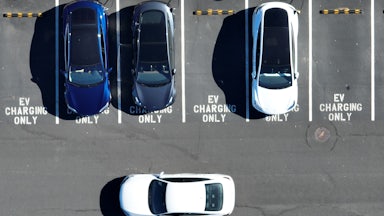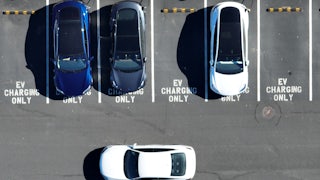This was supposed to be the week it all turned around for Ron DeSantis. Struggling in the Republican presidential primary polls—on Monday he dipped below 20 percent for the first time in Real Clear Politics’s survey roundup—it was well past time for a reset. And so, DeSantis’s team did what struggling campaigns have done for decades. They reassured donors. They ran new ads. They tightened belts, moving staffers from the campaign to a pro-DeSantis Super PAC amid a reported cash crunch. They launched new attacks on the front-runner, albeit characteristically tepid ones—a limp assault on Donald Trump for not doing enough to stop the January 6 riot was quickly walked back. And, for the first time, they courted the mainstream media: On Tuesday, DeSantis appeared on CNN to speak with Jake Tapper, who could hardly be expected to treat him with the kid gloves to which he had become accustomed when still Fox News’s golden boy. Once considered a front-runner, DeSantis was trying to hastily rebrand himself as a resurgent.
DeSantis’s conversation with Tapper went well enough, at least as far as the candidate was concerned. He is still a cold, occasionally repellent presence; it is still not entirely clear he knows what his favorite word (“woke,” uttered a characteristically infinite number of times) means. But if the goal was reassuring donors and the occasional Republican-voting CNN viewer that he could go toe-to-toe with the mainstream media, then mission accomplished.
There was just one problem. Well, two, really. The first is that, as I wrote on Monday, Ron DeSantis is still Ron DeSantis—and voters who get a good look at Ron DeSantis don’t seem to like him very much. The second is that the key dynamic of the 2024 Republican presidential primary race is the same as the key dynamic from its 2016 version, and it’s something that DeSantis has no control over: Donald Trump is dominating the news cycle, and there’s no sign at this point that DeSantis—or any other Republican—can change that.
Look no further than the Tapper interview. The story coming out of it wasn’t the Florida governor’s reset, it was that the sit-down got pushed back—so that CNN could cover several Trump-related news stories.
Ron DeSantis' CNN interview has been pushed back later in the hour bc of 1) reaction to Donald Trump's pending third indictment, 2) update from FL about Donald Trump's second indictment, and 3) breaking news about the Michigan attorney general charging the fake Trump electors.
— Tim Miller (@Timodc) July 18, 2023
These are, to be fair, all pretty big news stories! They’re certainly bigger than many of the Trump-centric incidents cable networks splashed on their chyrons during the 2016 election. They are, moreover, also bigger than an interview, even an exclusive and rare one, with a candidate who’s been floundering in the polls for months. A former president on the verge of being indicted for his role in an attempted coup is a story of historic importance; an interview with a man whose every utterance is some amalgam of a noun, a verb, and woke is not.
To an extent, this shows progress from the news media. Media coverage in 2016 was largely driven by base instincts, specifically the realization that putting Trump on television goosed ratings, thus (it goes without saying) producing giant, Scrooge McDuckish piles of cash.
Trump’s every utterance seemingly generated hours of news coverage; he set the terms of the 2016 race, and his rivals, to the extent that they existed at all, simply could not compete. Whenever another candidate emerged from their hole, Trump simply tweeted or said something ridiculous; news coverage would follow, and, more often than not, the pretender to the throne would sink into oblivion. Now, for the most part, coverage of Trump has revolved around stories that are actually news: namely that he is currently facing federal charges because he illegally retained highly sensitive classified documents in an almost comically insecure fashion and would apparently show them to anyone who entered a 50-foot radius of his private club and that he is almost certainly about to face even more charges for attempting to overturn a legitimate election.
Once the indictment arrives, its coverage will likely recede—somewhat. But the dynamic of the 2024 race thus far is that Trump’s rivals have had few opportunities to break out of a news cycle that has been consistently dominated by Donald Trump. The few chances they have had have quickly been swallowed by news that Donald Trump has been arrested or is about to be—or some other development in the numerous cases in which he is currently embroiled. Trump’s GOP challengers do have themselves to blame to an extent. The official line on the charges he’s facing is characteristically muddled—generally speaking, it is something like, “There are troubling details in the indictments, but these charges are clearly the product of a corrupt, Communist, McCarthyist witch hunt,” all of which neatly plays into Trump’s own typically barmy and self-aggrandizing defense. (His is that the Biden administration wants to take him down because he’s simply too powerful.)
This is especially problematic for a candidate like DeSantis, who needs not only the opportunity to recast himself from “weird guy nobody likes” to “weird guy who can beat Joe Biden” but also time to build that narrative. So far, there simply isn’t space. Any story about Ron DeSantis, good or bad (they’ve mostly been bad), has been crowded out by more coverage of Donald Trump. That coverage is mostly bad—then again, though, most of it in 2016 was too—but that probably suits him just fine, at least for now. After all, it’s suffocating his opposition and feeding the fires of his supporters’ resentment and anger. That dynamic, moreover, isn’t going to change anytime soon. Trump’s trials will likely stretch well into next year, if not beyond. He very well may face even more charges because we all think he did even more crimes than he’s been charged with. That will, at some point, be his problem. Right now, however, it’s Ron DeSantis’s.










